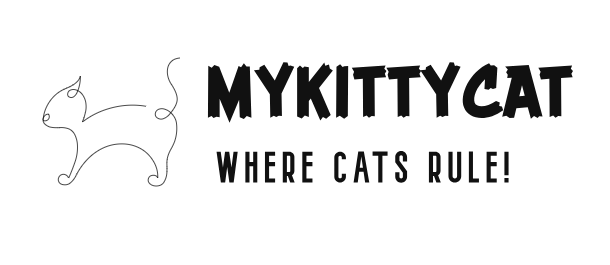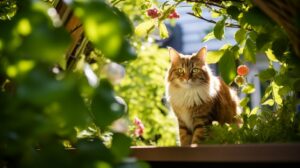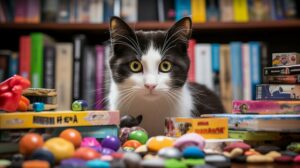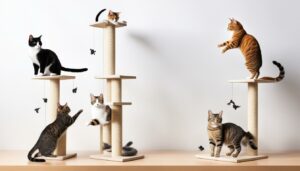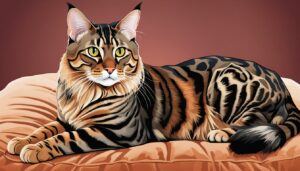As a journalist specializing in pet writing, I often come across many interesting facts about various cat breeds. Among them, the Maine Coon cat stands out for its unique hunting instincts. If you are a Maine Coon owner or planning to adopt a Maine Coon, understanding their innate hunting behaviors is crucial. In this article, we will explore the fascinating world of the Maine Coon’s hunting instincts and learn what sets this breed apart when it comes to hunting skills.

Key Takeaways:
- Understanding the Maine Coon’s hunting instincts is essential for pet owners.
- Maine Coons are well-known for their exceptional hunting abilities due to their innate predatory instincts.
- Their hunting behaviors are influenced by their ancestors’ hunting techniques and physical attributes.
- As pet owners, we can nurture and enhance their instincts through various interactive toys and puzzle feeders.
- It’s important to manage their hunting instincts in a domesticated environment to ensure their safety and well-being.
The Maine Coon: An Introduction
When I first laid eyes on a Maine Coon cat, I was struck by their distinct appearance. These gentle giants are known for their large size, with some weighing up to 25 pounds, and their signature fluffy tails. But their unique characteristics go beyond their physical appearance.
Maine Coons are beloved for their charming personalities. They are known to be intelligent, affectionate, and playful. These cats are often referred to as “gentle giants” because of their easygoing nature and friendly demeanor.
But what sets the Maine Coon breed apart from other cats? Let’s take a closer look at their characteristics:
| Maine Coon Characteristics | Description |
|---|---|
| Size | Maine Coons are one of the largest domesticated cat breeds, with some males weighing up to 25 pounds. |
| Coat | These cats have a water-resistant double coat that can come in a variety of colors and patterns. |
| Ears | Maine Coons have tufted ears that are tipped with lynx-like tufts of fur. |
| Tail | Their long, bushy tails are a hallmark of the breed and serve as a source of warmth in colder weather. |
| Personality | Maine Coons are known for their friendly and affectionate nature, as well as their intelligence and playful demeanor. |
Whether you’re a cat lover or just appreciate unique and charming pets, it’s hard not to fall in love with the Maine Coon breed. But there’s more to these cats than just their good looks and friendly personalities – their hunting instincts are one of their most fascinating traits. Let’s explore this further in the next section.
Understanding Hunting Instincts in Cats
As a cat owner, you may have observed your feline friend stalking a toy or pouncing on a piece of string. These natural hunting behaviors are instinctual and essential to a cat’s survival in the wild. Understanding these behaviors is crucial to unlocking the secrets of the Maine Coon’s hunting instincts.
Cats are natural predators and have developed a variety of hunting skills and techniques. From stalking and pouncing to chasing and catching, cats use a combination of innate behaviors and learned tactics to catch their prey.
The Maine Coon is no exception, with its predatory instincts honed over generations. Their hunting skills are unique and distinct from other cat breeds, making them exceptional hunters.
To truly understand the hunting behaviors of your Maine Coon, it’s important to recognize their natural instincts and how they relate to the breed’s specific characteristics. By doing so, you can provide them with an environment that fosters their innate hunting needs.
“There is no hunting like the hunting of the Maine Coon, for they hunt for the thrill of the hunt.”
As you explore the world of hunting instincts in Maine Coons, consider the role that these instincts play in their overall health and wellbeing. Providing them with outlets for their natural hunting behaviors can lead to a happier and more fulfilled life.
The Evolution of Hunting Skills in the Maine Coon
As one of the oldest natural breeds in North America, the Maine Coon’s hunting skills have been perfected over centuries of hunting for survival. Native to the rugged state of Maine, these cats adapted to the harsh environment and developed a set of unique characteristics that make them exceptional hunters. By tracing their lineage back to their European ancestors, we can gain valuable insights into the evolution of their hunting skills.
| European Ancestors | Maine Coon Hunting Habits |
|---|---|
| Wildcats, such as the Scottish Wildcat and European Wildcat | Stalking and ambushing prey from a distance |
| Norwegian Forest Cats | Excellent climbers, able to pounce on prey from above |
| Siberian Cats | Thick, water-resistant fur that enables them to hunt in wet environments |
As we can see from the table above, the Maine Coon’s ancestors contributed their own unique hunting techniques and adaptations to their genetic makeup. Over time, these traits were passed down and refined, resulting in the impressive hunting abilities we see in Maine Coons today.
While their ancestors primarily hunted for food and survival, modern-day Maine Coons are often kept as pets and no longer have to rely on their hunting skills for sustenance. However, these innate instincts are still present and can be observed in their behavior. Providing opportunities for them to exercise these hunting abilities, such as through interactive toys or supervised outdoor play, can be beneficial for their physical and mental wellbeing.
Overall, the evolution of the Maine Coon’s hunting skills is a testament to their resilience and adaptability as a breed. While they may no longer need to hunt for survival, their innate abilities and unique characteristics make them exceptional hunters and beloved pets.
Physical Attributes that Aid in Hunting
The Maine Coon’s large size and muscular build are just a few of their physical attributes that make them exceptional hunters. Their strong and agile bodies allow them to move swiftly and silently, making it easier for them to stalk prey without being detected. Their long and bushy tails help them maintain balance while climbing trees, a skill that comes in handy when they need to jump onto unsuspecting prey from a tree branch.
Maine Coons also have tufted ears that help protect their ears from dirt and debris while hunting. Their ears are incredibly sensitive and allow them to hear the faintest of sounds, enabling them to detect prey from a distance. Additionally, their strong paws and sharp claws give them a powerful grip, allowing them to catch and hold onto prey.
These physical features not only aid in hunting but also make the Maine Coon a majestic and strikingly beautiful breed of cat. It’s no wonder they are often referred to as the “gentle giants” of the cat world, as they possess both strength and grace.
Hunting Techniques and Strategies of the Maine Coon
It’s no secret that Maine Coons are exceptional hunters, but what makes them so skilled? Let’s take a closer look at the hunting techniques and strategies employed by these feline predators.
The Stalk
Maine Coons are known for their stealthy approach to hunting. They will often stalk their prey, taking careful and calculated steps to avoid detection. This technique is especially effective in outdoor hunting environments, where the Maine Coon can blend in with its surroundings and remain unseen until it’s time to strike.
The Ambush
Once the Maine Coon has successfully stalked its prey, it will often wait in hiding for the opportune moment to pounce. This ambush technique allows the Maine Coon to surprise its prey and catch it off guard.
The Pounce
When the moment is right, the Maine Coon will leap into action with a powerful pounce. Using their muscular legs and strong paws, they will take down their prey with precision and speed.
The Catch
After successfully pouncing on their prey, the Maine Coon will use their sharp claws to grasp and hold onto their catch. Their large size and strong physique make them capable of taking down even the largest prey.
It’s important to note that not all Maine Coons will exhibit these hunting techniques, as hunting instincts can vary from cat to cat. However, these techniques are commonly seen among the breed and have been honed over generations through natural selection.
Prey Selection and Hunting Preferences
As natural hunters, Maine Coons have specific prey preferences that reflect their unique characteristics. Due to their large size and impressive strength, they are often drawn to larger prey such as rodents, birds, and even small mammals like rabbits.
However, despite their impressive size, they are also skilled at catching smaller prey, such as insects and lizards, due to their agility and sharp reflexes.
Maine Coons are known for their curious and playful nature, which often leads them to hunt imaginary prey when living in domesticated environments. They may stalk and attack toys, shadows, or even crumbs on the floor.
Despite their instinctual need to hunt, it’s important to provide appropriate outlets for their behavior to ensure their safety and the safety of other household members. This can include offering interactive toys and puzzle feeders that simulate prey or using positive reinforcement to redirect their hunting behavior towards appropriate targets.
I once saw my Maine Coon jump several feet off the ground to catch a bird mid-flight. It was truly a sight to behold. – Maine Coon owner
Observing Hunting Behaviors in Domesticated Maine Coons
As a Maine Coon owner, I often observe my cat exhibiting natural hunting behaviors in various domesticated settings. For example, she loves to stalk and pounce on toys, and occasionally even imagines herself hunting imaginary prey around the house.
These behaviors are not only fun to watch but are also important for satisfying her instinctual needs. As Maine Coons have been bred for generations to be skilled hunters, it’s essential to provide opportunities for them to engage in these natural behaviors.
One way to observe and encourage hunting behaviors in Maine Coons is to provide a stimulating environment that mimics the outdoors. This can include adding climbing structures, hiding places, and interactive toys that encourage your cat to stalk, pounce, and catch prey.
It’s also important to create a safe environment for your Maine Coon to engage in these behaviors. Ensure that any interactive toys are sturdy and made from safe materials that won’t break apart and harm your cat. Additionally, keep any toxic plants or dangerous items out of reach.
The domestication of Maine Coons has not eliminated their hunting instincts. Instead, it’s important to embrace these natural behaviors and provide appropriate outlets for them to engage in. By observing and encouraging your Maine Coon’s hunting instincts, you can provide them with a fulfilling life that meets their unique needs.
Nurturing Hunting Instincts in Maine Coons
If you’re the proud owner of a Maine Coon, you may have noticed that they display natural hunting behaviors, even when they’re not outdoors. As a pet parent, it’s important to understand and nurture these instincts to keep your cat both mentally and physically stimulated.
One way to encourage your Maine Coon’s hunting instincts is by providing interactive toys that mimic natural prey. Look for toys that can be tossed, chased, or caught, like fishing pole toys or laser pointers. Puzzle feeders are another great option that allows your cat to use their natural hunting skills to “hunt” for their food.
Creating a stimulating environment is key to nurturing your Maine Coon’s natural instincts. Provide plenty of climbing opportunities, like cat trees or shelves, and hiding spots where they can stalk and hide. Note: Be careful when making DIY cat toys with items such as string, as these could be a choking hazard for your cat.
Engaging in playtime with your Maine Coon is also important for nurturing their hunting instincts. Set aside some time each day to play with your cat and allow them to practice their hunting skills. Not only does this provide mental and physical stimulation for your cat, but it also strengthens the bond between you and your furry friend.
Remember, Maine Coons are natural hunters, and it’s important to provide them with outlets for their instincts. By nurturing their hunting skills, you can ensure that your cat remains happy, healthy, and fulfilled.
Avoiding Overstimulation
While it’s important to provide opportunities for your Maine Coon to hone their hunting skills, it’s also important to prevent overstimulation. Keep an eye on your cat’s behavior during playtime and watch for signs of tiredness or irritability. It’s also important to provide a mix of active and calming activities to avoid overstimulation.
Consulting with a Veterinarian
If you have questions or concerns about nurturing your Maine Coon’s hunting instincts, don’t hesitate to consult with a veterinarian. Your vet can provide guidance on how to create the best environment for your cat’s needs and can also recommend toys and activities that are safe and appropriate for your Maine Coon.
Managing Hunting Instincts in Domesticated Maine Coons
As much as we love our Maine Coons, we must also remember that they are natural hunters with strong instincts. As responsible pet owners, it is our job to ensure that their hunting behavior is channeled appropriately, especially in a domestic setting.
Here are some tips for managing your Maine Coon’s hunting instincts:
- Provide your cat with plenty of toys: Interactive toys such as feather wands and puzzle feeders can help satisfy their hunting needs while keeping them entertained.
- Designate playtime: Set aside time each day for play and exercise with your cat. This will help them release pent-up energy and reduce their desire to hunt outside of playtime.
- Secure your home: Make sure your home is secure and your cat cannot escape. This will prevent them from hunting wildlife and getting into potentially dangerous situations.
- Keep them indoors: A great way to avoid confrontations with wildlife and reduce the risk of injury to your cat is by keeping them strictly indoors.
Remember, it’s important to channel your pet’s natural instincts in a way that is safe, healthy, and appropriate for their domestic environment. By following these tips, you can help manage your Maine Coon’s hunting instincts and provide them with a happy and fulfilling life as a cherished member of your family.

“Managing your Maine Coon’s hunting instincts is crucial to their well-being and your peace of mind as a pet owner. By providing them with appropriate outlets for their natural hunting behavior, you can ensure a happy and healthy life for you and your cat.”
Embracing the Wild Side of Your Maine Coon
Understanding the hunting instincts of your Maine Coon can deepen your appreciation for their unique and fascinating characteristics. By providing opportunities for them to express these innate behaviors, you can help your pet maintain a sense of fulfillment and happiness.
As I’ve learned through my research, Maine Coons have a strong drive to stalk, pounce, and catch prey. This is a natural behavior that our domesticated pets may not have many opportunities to express. But with the right toys, environment, and training, you can encourage their hunting instincts in a safe and positive way.
Remember, while we may not always understand our pets’ wild side, it’s important to respect their instincts and provide them with outlets to express them. By nurturing the hunting instincts of your Maine Coon, you can create a stronger bond with your pet and help them lead a happier and healthier life.
As we’ve discussed throughout this article, Maine Coons have a unique set of physical and behavioral characteristics that make them exceptional hunters. From their large size and muscular build to their keen sense of hearing and sight, these features are essential for their hunting success. By understanding and appreciating these characteristics, you can gain a deeper appreciation for your pet’s natural abilities and behaviors.
Additional Resources on Maine Coons and Their Hunting Instincts
If you’re intrigued and want to learn more about Maine Coons and their hunting instincts, there are plenty of resources available. Here are some recommendations:
Books:
- “The Maine Coon Cat” by Lynn M. Stone
- “Maine Coon Cats” by Carol Himsel Daly
- “Maine Coon Cats: Everything About Acquisition, Care, Nutrition, Behavior, Health Care and Breeding” by Richard T. Burrows
Websites:
- The Maine Coon Cat Club
- The International Cat Association
- The Cat Fanciers’ Association
Videos:
- Maine Coon Hunting Skills
- The Maine Coon Cat – Facts, Myths, and Legends
- Maine Coon Cat – Characteristics and Behavior
These resources can provide valuable insights into the Maine Coon breed and their hunting instincts. Whether you’re a seasoned Maine Coon owner or just starting to explore the breed, these resources are sure to be helpful.
Remember, understanding your Maine Coon’s natural instincts and behaviors can lead to a happier and healthier cat. So, dive into the world of Maine Coons and embrace their wild side!
